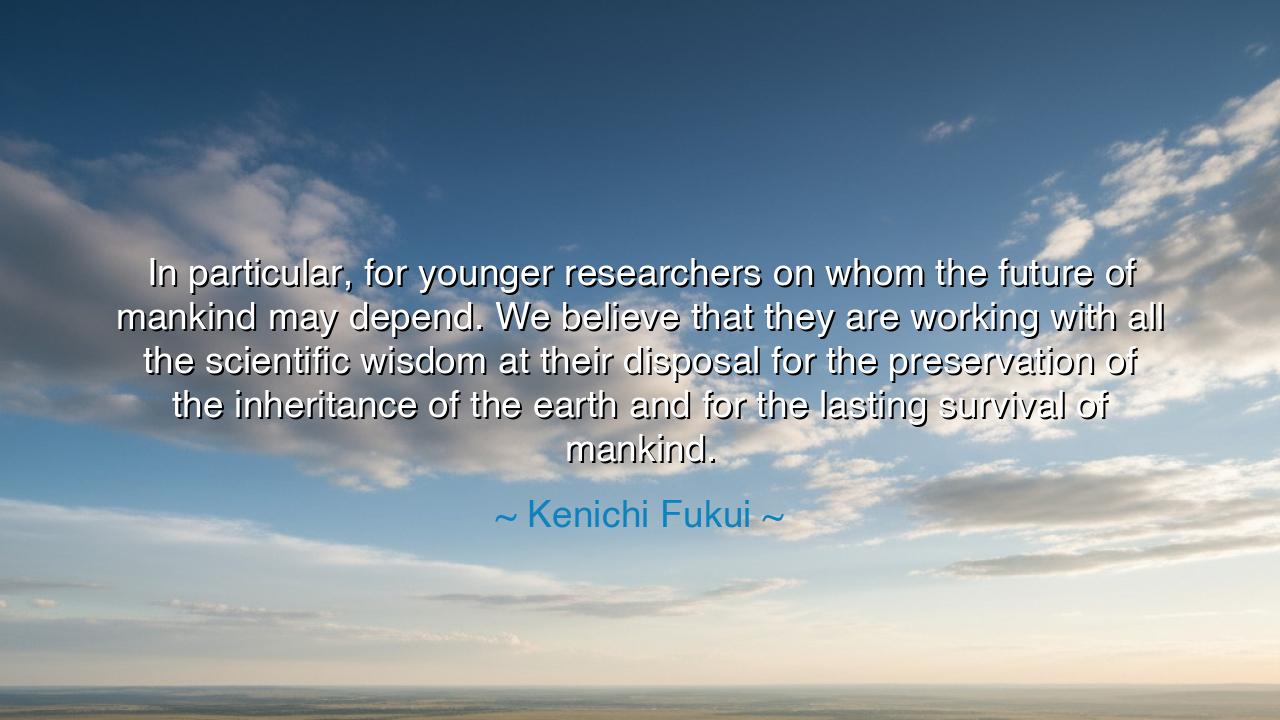
In particular, for younger researchers on whom the future of
In particular, for younger researchers on whom the future of mankind may depend. We believe that they are working with all the scientific wisdom at their disposal for the preservation of the inheritance of the earth and for the lasting survival of mankind.






Hearken, children of the ages, to the enlightened words of Kenichi Fukui, who proclaimed: “In particular, for younger researchers on whom the future of mankind may depend. We believe that they are working with all the scientific wisdom at their disposal for the preservation of the inheritance of the earth and for the lasting survival of mankind.” In these words lies the eternal truth of knowledge, responsibility, and the stewardship of life. The fate of humanity, Fukui teaches, is intertwined with the diligence, insight, and courage of those who labor in the pursuit of understanding, wielding scientific wisdom to safeguard the world for generations yet unborn.
Fukui emphasizes that youthful inquiry carries extraordinary weight. The researchers of today, guided by accumulated knowledge and driven by curiosity, are the architects of tomorrow. They are entrusted not only with the unraveling of nature’s mysteries, but with the preservation of the inheritance of the earth, the rich bounty of life and resources bequeathed to all by the ages. In their hands, discovery becomes both privilege and sacred duty.
Consider the life of Marie Curie, whose pioneering work in chemistry and physics revealed the secrets of radioactivity. Though her era was fraught with peril and skepticism, her courage and diligence expanded the scientific wisdom of the world, providing tools for medicine, energy, and understanding that continue to preserve and enhance life. Curie exemplifies Fukui’s principle: the labor of the dedicated researcher shapes the destiny and survival of humankind.
The ancients themselves honored those who sought knowledge for the benefit of the many. Aristotle, Archimedes, and the sages of the East held that wisdom must serve life, that discovery and reason must be applied for the common good. Fukui’s reflection resonates with this timeless teaching: scientific inquiry is noble not for its own sake, but for the stewardship it enables, safeguarding both the earth and the continuity of mankind.
Thus, his counsel is both exhortation and inspiration: recognize the sacred responsibility that accompanies knowledge. Every experiment, every insight, and every breakthrough contributes to the preservation of life and the enduring welfare of future generations. Wisdom must be paired with purpose, and understanding must guide action in the service of humanity and the earth alike.
Carry this teaching, children of generations yet to rise: cherish and honor those who labor in pursuit of scientific wisdom, for their work is the armor and the beacon of human survival. Let your own endeavors be guided by the same principle: that knowledge, courage, and diligence are entrusted not only to enlighten the present, but to secure the lasting inheritance of the earth for all who follow.






TVVu Tuong Vi
This quote feels deeply hopeful, almost reverent toward the power of human intellect. It makes me ask, though, whether wisdom in science is enough without wisdom in humanity. We’ve seen how technology can both heal and harm. Are young researchers being equipped with ethical and philosophical guidance, not just technical skill? The preservation of the earth may depend as much on moral clarity as on scientific innovation.
HLHuynh Ngoc Han Ly
As a reader, I’m struck by the faith this expresses in science and youth. It assumes a kind of moral purity in research that feels idealistic. But is it realistic? Scientists today often work under corporate or governmental agendas. How can they truly act for the preservation of humanity if their work is constrained by profit motives or politics? I wonder whether Fukui’s optimism still holds in today’s research climate.
TH15 Thien Huong
This statement gives me hope for the younger generation, but also raises a troubling question: do they have enough support to fulfill such a monumental task? Many brilliant researchers struggle with funding, political barriers, or lack of public understanding. How can society expect them to safeguard the planet if we don’t provide the conditions for them to thrive? I think Fukui’s words are both an encouragement and a warning.
MTNguyen Minh Tiep
Reading this, I feel a mix of admiration and guilt. Admiration for those dedicating their lives to scientific advancement, and guilt because the rest of us often take their work for granted. But can we really depend entirely on scientists for humanity’s future? What about the role of education, ethics, and collective responsibility? Maybe Fukui’s statement is a call for everyone to value knowledge, not just those in research.
UGUser Google
I find this sentiment inspiring—it acknowledges the moral dimension of science. Yet, it also makes me wonder: can scientific wisdom alone ensure the survival of mankind? What about the political and economic systems that often undermine environmental or ethical progress? It seems unfair to assume scientists can fix what society continues to damage. Perhaps the real challenge lies in integrating science with compassion, governance, and cultural change.